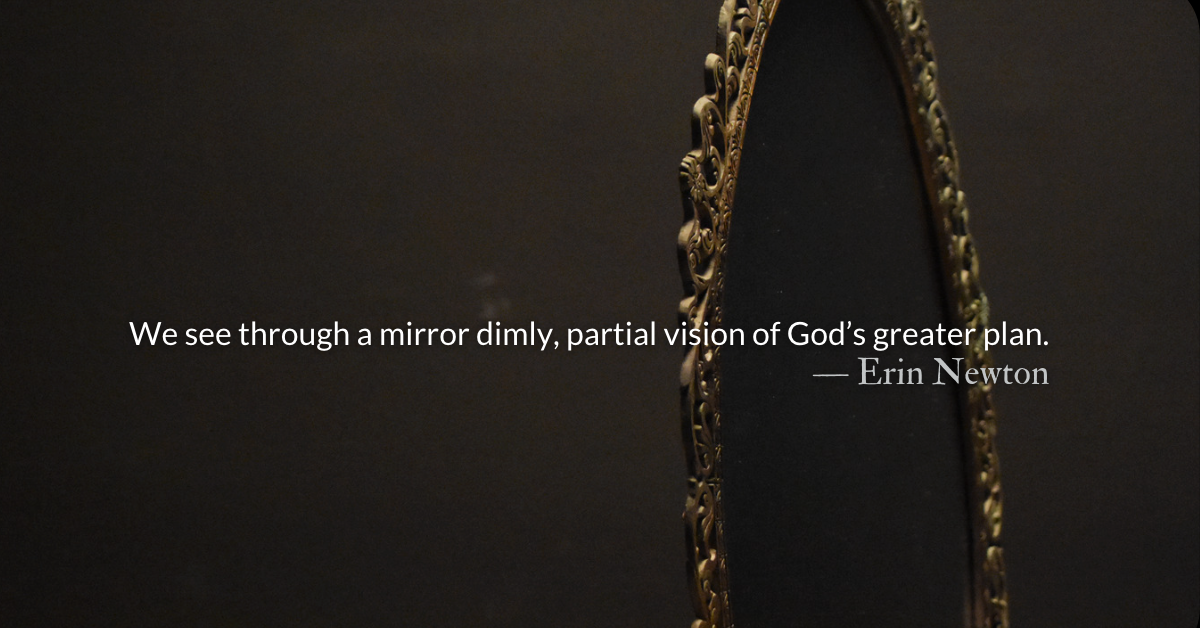Scripture Focus: Genesis 42.8
8 Although Joseph recognized his brothers, they did not recognize him.
Reflection: Through Mirrors Dimly
By Erin Newton
This chapter opens with the next saga in Joseph’s life, the reunion with his brothers. It is a long story with many twists and turns. If Joseph’s life were a movie, the tagline would be: “What you meant for evil, God has meant for good” (Genesis 50.20).
Joseph was abused by his brothers. They tried to kill him but settled for having him sold into slavery. He was wrongfully accused and imprisoned. Joseph, however, rose to a place of authority in Egypt and his brothers, unknowingly, came to him to seek mercy.
Joseph was a blessing in disguise. He wasn’t in a real disguise; his brothers simply didn’t recognize him. Now grown older, they had graying hair and aged faces. Despite their long separation, Joseph could recognize his brothers. So, it is more likely that God prevented the brothers from recognizing him.
Here is something good, life-giving in fact, but they are blind to it. The brothers cling to hope that the man before them will be merciful. Their vision is muddled, like seeing through a mirror dimly.
What makes this story intriguing is the vantage point we have as readers. We know who the man is, we know it is their brother. If we’ve read this story before, we know it ends with joy.
But we never have that vantage point in our own lives. We are blind to how God will make all things work together for our good. We only feel the pain of our suffering, the sting of desperation. Like the brothers, we are taking steps in faith and worrying about every new crisis.
God was still working in Joseph’s story and the big reveal took much longer than we’d hope in this chapter. (We are a bit prone to demanding instant gratification, in stories and in our lives.)
We see through a mirror dimly, partial vision of God’s greater plan.
When the shadows tempt us to despair, let us pray:
Lord, you see us in the darkest of places where everything seems impossible. We need a way out, but every door is shut. Let us cling to the truth that you sent Joseph to store grain for his brothers, seven years before they ever knew they needed it. Our lives are as precious as those. Let us step in faith knowing you have stored up provision before we knew to call on you.
Divine Hours Prayer: The Morning Psalm
Those who trust in the Lord are like Mount Zion, which cannot be moved, but stands fast forever.
The hills stand about Jerusalem; so does the Lord stand round about his people, from this time forth forevermore.
The scepter of the wicked shall not hold sway over the land allotted to the just, so that they just shall not put their hands to evil. — Psalm 125.1-3
Today’s Readings
Genesis 42 (Listen 5:08)
Matthew 3 (Listen 2:17)
Read more about Vengeance, Arrogance, and Partiality
May we find in Jesus forgiveness to replace our vengeance, humility to replace our arrogance, and justice to replace our partiality.
Read more about Treasure in Our Sacks
We underestimate God’s generosity. Like Joseph, Jesus doesn’t accept our payments, he suffered and made our payment in full.









